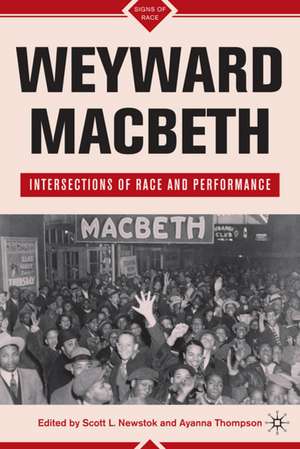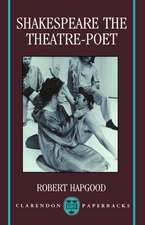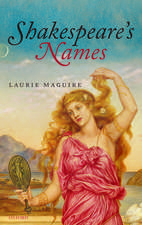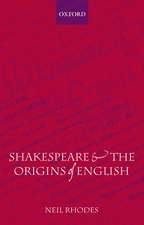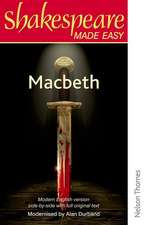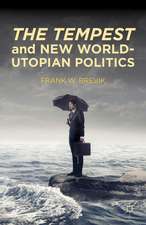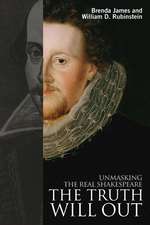Weyward Macbeth: Intersections of Race and Performance: Signs of Race
Editat de S. Newstok, Kenneth A. Loparoen Limba Engleză Paperback – 12 feb 2010
| Toate formatele și edițiile | Preț | Express |
|---|---|---|
| Paperback (1) | 421.93 lei 6-8 săpt. | |
| Palgrave Macmillan US – 12 feb 2010 | 421.93 lei 6-8 săpt. | |
| Hardback (1) | 393.52 lei 6-8 săpt. | |
| Palgrave Macmillan US – 12 feb 2010 | 393.52 lei 6-8 săpt. |
Preț: 421.93 lei
Nou
Puncte Express: 633
Preț estimativ în valută:
80.73€ • 84.52$ • 66.80£
80.73€ • 84.52$ • 66.80£
Carte tipărită la comandă
Livrare economică 05-19 aprilie
Preluare comenzi: 021 569.72.76
Specificații
ISBN-13: 9780230616424
ISBN-10: 0230616429
Pagini: 288
Ilustrații: XVII, 288 p.
Dimensiuni: 152 x 229 x 18 mm
Greutate: 0.43 kg
Ediția:2010
Editura: Palgrave Macmillan US
Colecția Palgrave Macmillan
Seria Signs of Race
Locul publicării:New York, United States
ISBN-10: 0230616429
Pagini: 288
Ilustrații: XVII, 288 p.
Dimensiuni: 152 x 229 x 18 mm
Greutate: 0.43 kg
Ediția:2010
Editura: Palgrave Macmillan US
Colecția Palgrave Macmillan
Seria Signs of Race
Locul publicării:New York, United States
Cuprins
PART I: BEGINNINGS What is a 'Weyward' Macbeth?;Ayanna Thompson Weird Brothers: What Thomas Middleton's The Witch Can Tell Us about Race, Sex, and Gender in Macbeth; Celia R. Daileader PART II: EARLY AMERICAN INTERSECTIONS 'Blood will have blood': Violence, Slavery, and Macbeth in the Antebellum American Imagination; Heather S. Nathans The Exorcism of Macbeth: Frederick Douglass's Appropriation of Shakespeare; John C. Briggs Ira Aldridge as Macbeth; Bernth Lindfors Minstrel Show Macbeth; Joyce Green MacDonald Reading Macbeth in Texts by and about African Americans, 1903 1944: Race and the Problematics of Allusive Identification; Nick Moschovakis PART III: FEDERAL THEATRE PROJECT(S) Before Welles: A 1935 Boston Production; Lisa N. Simmons Black Cast Conjures White Genius: Unraveling the Mystique of Orson Welles's 'Voodoo' Macbeth; Marguerite Rippy After Welles: Re-do Voodoo Macbeths; Scott L. Newstok The Vo-Du Macbeth!: Travels and Travails of a Choreo-Drama Inspired by the FTP Production; Lenwood Sloan PART IV: FURTHER STAGES A Black Actor's Guide to the Scottish Play, Or, Why Macbeth Matters; Harry J. Lennix Asian American Theatre Re-imagined: Shogun Macbeth in New York; Alexander C. Y. Huang The Tlingit Play: Macbeth and Native Americanism; Anita Maynard-Losh A Post-Apocalyptic Macbeth: Teatro LA TEA's Macbeth 2029; José A. Esquea Multi-cultural, Multi-lingual Macbeth; William C. Carroll PART V: MUSIC Reflections on Verdi, Macbeth, and Non-Traditional Casting in Opera; Wallace McClain Cheatham Ellington's Dark Lady; Douglas Lanier Hip-Hop Macbeths, 'Digitized Blackness,' and the Millennial Minstrel: Illegal Culture Sharing in the Virtual Classroom; Todd Landon Barnes PART VI: SCREEN Riddling Whiteness, Riddling Certainty: Roman Polanski's Macbeth; Francesca Royster Semper Die: Marines Incarnadine in Nina Menkes's The Bloody Child: An Interior of Violence; Courtney Lehmann Shades of Shakespeare: Colorblind Casting and Interracial Couples in Macbeth in Manhattan, Grey's Anatomy, and Prison Macbeth; Amy Scott-Douglass PART VII: SHAKESPEAREAN (A)VERSIONS Three Weyward Sisters: African-American Female Poets Conjure with Macbeth; Charita Gainey-O'Toole and Elizabeth Alexander 'Black up again': Combating Macbeth in Contemporary African-American Plays; Philip C. Kolin Black Characters in Search of an Author: Black Plays on Black Performers of Shakespeare; Peter Erickson Epilogue: ObaMacbeth: National Transition as National Traumission; Richard Burt Appendix: Selected Productions of Macbeth Featuring Non-Traditional Casting; Brent Butgereit and Scott L. Newstok
Recenzii
“This collection … explore raced and non-traditional Macbeth on its own terms and through an extraordinary diversity of perspectives.” (Rebecca Dark, Early Modern Studies Journal, Vol. 5, October 26, 2018)
“Weyward Macbeth offers a fascinating account of the use and misuse of Shakespeare’s tragedy by a culture trying to confront its own guilt and ghosts.” (Maria Browning, chapter16.org, October 27, 2017)
“Weyward Macbeth is an exceptionally rich and suggestive collection of essays, the kind of book that you know you’ll return to time and again to mull over the nuggets that its wide and wise contributors have unearthed.” (Willy Maley, Journal of the Northern Renaissance, February 26, 2013) “The book presents work that is interdisciplinary and will appeal to a variety of scholars. … Weyward Macbeth is a far-reaching anthology, well worth a read for scholars of Shakespeare, cinema, literature, and music. As a theatre text, it is particularly useful. … Weyward Macbeth emphasizes how strongly theatre reflects and informs America’s political history; the book enhances both American theatre and Shakespeareanscholarship.” (Victoria P. Lantz, Theatre Survey, Vol. 53 (2), September, 2012)
“The book is certainly a worthwhile contribution: even essays that read as isolated reflections disengaged from the dialogue promoted by the book prove to be highly interesting; when connections are made, they are often unexpected and illuminating. … the collection also amply demonstrates that we can learn much about both history and the play when we attend to the many wayward ways in which race and the play have intersected in history.” (Yu Jin Ko, Shakespeare Quarterly, Vol. 63 (2), 2012)
“This is a substantial collection, consisting of twenty-six articles and an Appendix. … Together, they are essential to anyone seeking to understand the importance of Macbeth to the history of race relations in America, especially black–white relations. … This collection provides ample evidence of this truth, and underscores how important it is for us to recognize Shakespeare’s ambivalent legacy at work in America’s race relations today.” (Jennifer Clement, Parergon, Vol. 29 (2), 2012)
“The collection as a whole offers a conglomeration of various topics that open up a new approach to Macbeth. … The diversity of perspectives here is rich and provocative and will no doubt encourage further studies of Macbeth and race. Of equal interest to Shakespeareans, Americanists, cultural historians, teachers, and theater professionals, the collection as a whole is notable for its thorough and strikingly original readings of a largely overlooked topic.” (Sonya Freeman Loftis, Borrowers and Lenders, Vol. 7 (2), October, 2012)
“Rarely is a collection of essays so focused and yet so broad, so comprehensive, and yet so intellectually open-ended. Any one of the essays on its own would be a respectable contribution to the study of race and Shakespeare, but it is in their collective resonance with and across each other, their symphonic ambition, that the volume’s significance lays.” (Shane Vogel, African American Review, Vol. 44 (1-2), 2011)
“Weyward Macbeth is a collection of essays providing a fascinating, interdisciplinary record … . The collection as a whole makes for rich and varied reading. … The book is thus particularly relevant to Shakespeare studies, performance and pedagogy in southern Africa. It provides us with a fascinating archive to work with and against. … It contains much of interest for literary and performance scholars, for actors and directors, for English teachers, for students … and for readers interested inthe signs of race.” (Denise Newfield, Shakespeare in Southern Africa, Vol. 23, 2011)
“Weyward Macbeth admirably covers the long and complex history of the play within American racial discourse by using an interdisciplinary approach to elucidate much that has been neglected or unconnected. … Weyward Macbeth goes beyond filling that void by establishing the standard for further research into any aspect of Macbeth’s intimate relationship with racial discourse in America.” (M. Tyler Sasser, South Atlantic Review, Vol. 76 (3), 2011)
“The collection brings forth new and sometimes forgotten stories about how directors, rhetoricians, and performers use Macbeth both to interrogate and confirm racial disparity in the United States. … the range of media and time periods covered is quite commendable, as is the inclusion of both scholars' and practitioners' perspectives. Because the essays are shorter, this collection could supplement course material or provide an excellent primer for scholars interested in how race has informed American appropriations of Macbeth.” (Allison Kellar Lenhardt, The Upstart Crow, Vol. 30, 2011)
“The book will be useful to a variety of readers, including scholars of Shakespeare and of American performance and theatre history. Essays pertaining to the contemporary practice of multilingual or intercultural Shakespearean performance will also be of interest to practitioners. … Weyward Macbeth provides ample resources for future scholarship. … Weyward Macbeth productively charts intersections between the play’s own representations of race and the racial discourses that have informed its performance history, and alerts us to the ‘weyward’ within the play’s contemporary productions.” (Nicole Boyar, Theatre Journal, Vol. 63 (4), December, 2011)
“This extraordinary collection of essays is essential for every student and teacher of Shakespeare. It is exceptional reading with astonishing new information for anyone wishing to keep remarkably abreast of what is happening in American culture.” (Glenda E. Gill, This Rough Magic, thisroughmagic.org, Vol. 1 (1), January, 2010)
"Timely . . . as with the best works of historical scholarship, Newstok and Thompson's collection merges detailed historiography with immediate relevancy, making this a valuable book indeed." - Dan Venning, Theatre History Studies
"There is something for everyone in this worthy volume." - Kevin Wetmore, Jr., CHOICE
"Remarkable." - Jonathan Gil Harris, Studies in English Literature
"Weyward Macbeth is an excellent companion piece for theatre educators looking to enrich classroom instruction or to further students' understanding of fully realized productions. Newstok and Thompson's diverse collection of provocative and enlightening articles serves as a valued addition to Shakespearean scholarship and as a complement to the study of Macbeth." - John Robert Moss, Theatre Topics
"A welcome addition to the scholarship on theatrical history and practice . . . most of the contributors do show the considerable charge that thinking differently, or highlighting and remembering race, can bring to the play . . . most of the authors at some point refer parenthetically to one or more of their fellow contributors, offering a sense of cogency, a wider arc of discussion, than many such collections manage." - EricMallin, College Literature
"In this remarkable and ground breaking book, the editors have put together essays that examine the text and spirit of Macbeth from different and, sometimes, startling perspectives." - Clement Ndulute, The Griot: The Journal of African American Studies
"This rich and provocative collection of essays is a compilation of historical, theoretical and interdisciplinary viewpoints on ways in which performances of Macbeth have engaged issues of race . . . Weyward Macbeth leaves a reader strangely unsettled as, of course, does Macbeth. I closed the volume with a new sense of Macbeth's importance to issues of race in the United States, more acutely aware of the ferment and potential of engaging with this intersectional study, and yet also conscious of the still fragmented state of this aptly named 'weyward' pursuit . . . Many diverse perspectives are at work in this volume, and not always towards the same ends. But in the last analysis, thatdiversity seems utterly appropriate: the move here is not to establish a new orthodoxy but to break down received ideas about race and Shakespeare . . . Newstok and Thompson's volume corroborates that vision of multiple Shakespeares and multiple Shakespeareans, both within 'the confines of the script' and beyond it." - Nicholas Jones, Shakespeare Bulletin
"This collection undoubtedly demonstrates the intractable diversity of American readings of Macbeth over time . . . Weyward Macbeth goes a long way in making the effort to tell that difficult history." - Robert Ormsby, Modern Drama
"Weyward Macbeth deserves reading - and re-reading - because, contrary to popular belief, Orson Welles's famous 'Voodoo' Macbeth (1936) was far from unique in re-casting Shakespeare in a non-traditional setting. With over 100 cross-racial productions recorded here, you are bound to ask: why have so many Americans been repeatedly drawn to this particular play in the context of racial discourses? Read this penetrating study to find out - it's an intellectual delight." - James V. Hatch, Professor Emeritus, The Graduate Theatre Program at the City University of New York and co-author of A History of African American Theatre
"Weyward Macbeth is an interesting and deeply thought-provoking book, which is well set out, and ideal to dip into when a fresh perspective is required about Macbeth." - Jane Wright, seriouslyshakespeare.com
“Weyward Macbeth offers a fascinating account of the use and misuse of Shakespeare’s tragedy by a culture trying to confront its own guilt and ghosts.” (Maria Browning, chapter16.org, October 27, 2017)
“Weyward Macbeth is an exceptionally rich and suggestive collection of essays, the kind of book that you know you’ll return to time and again to mull over the nuggets that its wide and wise contributors have unearthed.” (Willy Maley, Journal of the Northern Renaissance, February 26, 2013) “The book presents work that is interdisciplinary and will appeal to a variety of scholars. … Weyward Macbeth is a far-reaching anthology, well worth a read for scholars of Shakespeare, cinema, literature, and music. As a theatre text, it is particularly useful. … Weyward Macbeth emphasizes how strongly theatre reflects and informs America’s political history; the book enhances both American theatre and Shakespeareanscholarship.” (Victoria P. Lantz, Theatre Survey, Vol. 53 (2), September, 2012)
“The book is certainly a worthwhile contribution: even essays that read as isolated reflections disengaged from the dialogue promoted by the book prove to be highly interesting; when connections are made, they are often unexpected and illuminating. … the collection also amply demonstrates that we can learn much about both history and the play when we attend to the many wayward ways in which race and the play have intersected in history.” (Yu Jin Ko, Shakespeare Quarterly, Vol. 63 (2), 2012)
“This is a substantial collection, consisting of twenty-six articles and an Appendix. … Together, they are essential to anyone seeking to understand the importance of Macbeth to the history of race relations in America, especially black–white relations. … This collection provides ample evidence of this truth, and underscores how important it is for us to recognize Shakespeare’s ambivalent legacy at work in America’s race relations today.” (Jennifer Clement, Parergon, Vol. 29 (2), 2012)
“The collection as a whole offers a conglomeration of various topics that open up a new approach to Macbeth. … The diversity of perspectives here is rich and provocative and will no doubt encourage further studies of Macbeth and race. Of equal interest to Shakespeareans, Americanists, cultural historians, teachers, and theater professionals, the collection as a whole is notable for its thorough and strikingly original readings of a largely overlooked topic.” (Sonya Freeman Loftis, Borrowers and Lenders, Vol. 7 (2), October, 2012)
“Rarely is a collection of essays so focused and yet so broad, so comprehensive, and yet so intellectually open-ended. Any one of the essays on its own would be a respectable contribution to the study of race and Shakespeare, but it is in their collective resonance with and across each other, their symphonic ambition, that the volume’s significance lays.” (Shane Vogel, African American Review, Vol. 44 (1-2), 2011)
“Weyward Macbeth is a collection of essays providing a fascinating, interdisciplinary record … . The collection as a whole makes for rich and varied reading. … The book is thus particularly relevant to Shakespeare studies, performance and pedagogy in southern Africa. It provides us with a fascinating archive to work with and against. … It contains much of interest for literary and performance scholars, for actors and directors, for English teachers, for students … and for readers interested inthe signs of race.” (Denise Newfield, Shakespeare in Southern Africa, Vol. 23, 2011)
“Weyward Macbeth admirably covers the long and complex history of the play within American racial discourse by using an interdisciplinary approach to elucidate much that has been neglected or unconnected. … Weyward Macbeth goes beyond filling that void by establishing the standard for further research into any aspect of Macbeth’s intimate relationship with racial discourse in America.” (M. Tyler Sasser, South Atlantic Review, Vol. 76 (3), 2011)
“The collection brings forth new and sometimes forgotten stories about how directors, rhetoricians, and performers use Macbeth both to interrogate and confirm racial disparity in the United States. … the range of media and time periods covered is quite commendable, as is the inclusion of both scholars' and practitioners' perspectives. Because the essays are shorter, this collection could supplement course material or provide an excellent primer for scholars interested in how race has informed American appropriations of Macbeth.” (Allison Kellar Lenhardt, The Upstart Crow, Vol. 30, 2011)
“The book will be useful to a variety of readers, including scholars of Shakespeare and of American performance and theatre history. Essays pertaining to the contemporary practice of multilingual or intercultural Shakespearean performance will also be of interest to practitioners. … Weyward Macbeth provides ample resources for future scholarship. … Weyward Macbeth productively charts intersections between the play’s own representations of race and the racial discourses that have informed its performance history, and alerts us to the ‘weyward’ within the play’s contemporary productions.” (Nicole Boyar, Theatre Journal, Vol. 63 (4), December, 2011)
“This extraordinary collection of essays is essential for every student and teacher of Shakespeare. It is exceptional reading with astonishing new information for anyone wishing to keep remarkably abreast of what is happening in American culture.” (Glenda E. Gill, This Rough Magic, thisroughmagic.org, Vol. 1 (1), January, 2010)
"Timely . . . as with the best works of historical scholarship, Newstok and Thompson's collection merges detailed historiography with immediate relevancy, making this a valuable book indeed." - Dan Venning, Theatre History Studies
"There is something for everyone in this worthy volume." - Kevin Wetmore, Jr., CHOICE
"Remarkable." - Jonathan Gil Harris, Studies in English Literature
"Weyward Macbeth is an excellent companion piece for theatre educators looking to enrich classroom instruction or to further students' understanding of fully realized productions. Newstok and Thompson's diverse collection of provocative and enlightening articles serves as a valued addition to Shakespearean scholarship and as a complement to the study of Macbeth." - John Robert Moss, Theatre Topics
"A welcome addition to the scholarship on theatrical history and practice . . . most of the contributors do show the considerable charge that thinking differently, or highlighting and remembering race, can bring to the play . . . most of the authors at some point refer parenthetically to one or more of their fellow contributors, offering a sense of cogency, a wider arc of discussion, than many such collections manage." - EricMallin, College Literature
"In this remarkable and ground breaking book, the editors have put together essays that examine the text and spirit of Macbeth from different and, sometimes, startling perspectives." - Clement Ndulute, The Griot: The Journal of African American Studies
"This rich and provocative collection of essays is a compilation of historical, theoretical and interdisciplinary viewpoints on ways in which performances of Macbeth have engaged issues of race . . . Weyward Macbeth leaves a reader strangely unsettled as, of course, does Macbeth. I closed the volume with a new sense of Macbeth's importance to issues of race in the United States, more acutely aware of the ferment and potential of engaging with this intersectional study, and yet also conscious of the still fragmented state of this aptly named 'weyward' pursuit . . . Many diverse perspectives are at work in this volume, and not always towards the same ends. But in the last analysis, thatdiversity seems utterly appropriate: the move here is not to establish a new orthodoxy but to break down received ideas about race and Shakespeare . . . Newstok and Thompson's volume corroborates that vision of multiple Shakespeares and multiple Shakespeareans, both within 'the confines of the script' and beyond it." - Nicholas Jones, Shakespeare Bulletin
"This collection undoubtedly demonstrates the intractable diversity of American readings of Macbeth over time . . . Weyward Macbeth goes a long way in making the effort to tell that difficult history." - Robert Ormsby, Modern Drama
"Weyward Macbeth deserves reading - and re-reading - because, contrary to popular belief, Orson Welles's famous 'Voodoo' Macbeth (1936) was far from unique in re-casting Shakespeare in a non-traditional setting. With over 100 cross-racial productions recorded here, you are bound to ask: why have so many Americans been repeatedly drawn to this particular play in the context of racial discourses? Read this penetrating study to find out - it's an intellectual delight." - James V. Hatch, Professor Emeritus, The Graduate Theatre Program at the City University of New York and co-author of A History of African American Theatre
"Weyward Macbeth is an interesting and deeply thought-provoking book, which is well set out, and ideal to dip into when a fresh perspective is required about Macbeth." - Jane Wright, seriouslyshakespeare.com
Notă biografică
Scott Newstok is the author of How to Think like Shakespeare and Quoting Death in Early Modern England; editor of Paradise Lost: A Primer; and co-editor of Weyward Macbeth, a collection of essays exploring the intersection of race and performance.
Ayanna Thompson is director of the Arizona Center for Medieval & Renaissance Studies (ACMRS) at Arizona State University. She is the author of Shakespeare in the Theatre: Peter Sellars (2018), Teaching Shakespeare with Purpose: A Student-Centred Approach (2016), Passing Strange: Shakespeare, Race, and Contemporary America (2011), and Performing Race and Torture on the Early Modern Stage (2008). She wrote the new introduction for the revised Arden Othello (2016), and is the editor of Colorblind Shakespeare: New Perspectives on Race and Performance (2006).
AYANNA THOMPSON Arizona State University, USA HEATHER NATHANS University of Maryland, USA BERNTH LINDFORS University of Texas Austin, USA JOHN BRIGGS University of California, Riverside, USA JOYCE GREEN MACDONALD University of Kentucky, USA LISA SIMMONS Independent Filmmaker MARGUERITE RIPPY Marymount University, USA SCOTT NEWSTOK Rhodes College, USA LENWOOD SLOAN Director of Cultural and Heritage Tourism Program Pennsylvania, USA WALLACE CHEATHAM Composer and Musicologist DOUGLAS LANIER University of New Hampshire, USA TODD LANDON BARNES University of California, Irvine, USA PETER ERICKSON Williams College, USA PHILIP KOLIN University of Southern Mississippi, USA CELIA DAILEADER Florida State University, USA AMY SCOTT-DOUGLASS Denison University, USA FRANCESCA ROYSTER DePaul University, USA COURTNEY LEHMANN University of the Pacific, USA HARRY J. LENNIX Actor RICHARD BURT University of Florida, USA NICK MOSCHOVAKIS Reed College, USA ALEXANDER C. Y. HUANG Penn State University, USA ANITA MAYNARD-LOSH Director JOSÉ A. ESQUEA Director WILLIAM C. CARROLL Boston University CHARITA GAINEY-O'TOOLE doctoral student, Harvard, USA ELIZABETH ALEXANDER Yale, USA BRENT BUTGEREIT Rhodes College, USA
Ayanna Thompson is director of the Arizona Center for Medieval & Renaissance Studies (ACMRS) at Arizona State University. She is the author of Shakespeare in the Theatre: Peter Sellars (2018), Teaching Shakespeare with Purpose: A Student-Centred Approach (2016), Passing Strange: Shakespeare, Race, and Contemporary America (2011), and Performing Race and Torture on the Early Modern Stage (2008). She wrote the new introduction for the revised Arden Othello (2016), and is the editor of Colorblind Shakespeare: New Perspectives on Race and Performance (2006).
AYANNA THOMPSON Arizona State University, USA HEATHER NATHANS University of Maryland, USA BERNTH LINDFORS University of Texas Austin, USA JOHN BRIGGS University of California, Riverside, USA JOYCE GREEN MACDONALD University of Kentucky, USA LISA SIMMONS Independent Filmmaker MARGUERITE RIPPY Marymount University, USA SCOTT NEWSTOK Rhodes College, USA LENWOOD SLOAN Director of Cultural and Heritage Tourism Program Pennsylvania, USA WALLACE CHEATHAM Composer and Musicologist DOUGLAS LANIER University of New Hampshire, USA TODD LANDON BARNES University of California, Irvine, USA PETER ERICKSON Williams College, USA PHILIP KOLIN University of Southern Mississippi, USA CELIA DAILEADER Florida State University, USA AMY SCOTT-DOUGLASS Denison University, USA FRANCESCA ROYSTER DePaul University, USA COURTNEY LEHMANN University of the Pacific, USA HARRY J. LENNIX Actor RICHARD BURT University of Florida, USA NICK MOSCHOVAKIS Reed College, USA ALEXANDER C. Y. HUANG Penn State University, USA ANITA MAYNARD-LOSH Director JOSÉ A. ESQUEA Director WILLIAM C. CARROLL Boston University CHARITA GAINEY-O'TOOLE doctoral student, Harvard, USA ELIZABETH ALEXANDER Yale, USA BRENT BUTGEREIT Rhodes College, USA
